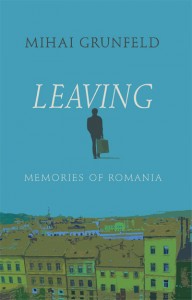SYNOPSIS
 The narrative begins in Cluj, Romania, a city of about 200,000 in which Romanians, Hungarians and Jews lived in relative peace though not without underlying ethnic and anti-Semitic tensions. This book consists principally of stories about the narrator’s childhood and adolescence as the son of impoverished Holocaust survivors. His parents are unable to talk about their past, but their lives – and the lives of their two sons – are utterly shaped by it. As the narrator sheds the relative innocence of childhood, he becomes more consciously aware of his parents’ profound loneliness, the glaring gaps in his family’s history and the questions that go unanswered.
The narrative begins in Cluj, Romania, a city of about 200,000 in which Romanians, Hungarians and Jews lived in relative peace though not without underlying ethnic and anti-Semitic tensions. This book consists principally of stories about the narrator’s childhood and adolescence as the son of impoverished Holocaust survivors. His parents are unable to talk about their past, but their lives – and the lives of their two sons – are utterly shaped by it. As the narrator sheds the relative innocence of childhood, he becomes more consciously aware of his parents’ profound loneliness, the glaring gaps in his family’s history and the questions that go unanswered.
At fourteen, the narrator is required to leave school in order to learn a trade and earn money to help support his parents and elder brother who continues in school and is headed for the university. The injustice and indignity of being yanked out of school by his uncle on behalf of his parents is exacerbated by a newfound view of his parents’ powerlessness. This is painful, but also freeing. Adolescent experimentation, the daily grind of factory work, direct experiences of anti-Semitism, and big dreams of escaping the politically restrictive system in which he lives shape the narrator’s stories.
It is from this context, that the narrator and his brother embark on a trip to Czechoslovakia in January 1969, with the expectation of never seeing their parents and friends again. They travel by train to Czechoslovakia in the months shortly after the Russian invasion of Prague. There, after several failed attempts, they succeed in crossing the border to Austria and find their way to Vienna. Arriving in Vienna shortly after Christmas-time, they are awed by the glitter and abundance. The narrative ends with the two brothers leaving Vienna for Israel.
The life and events recounted in “Leaving – Memories of Romania” set the stage for a second volume in which the narrator (and author) travels to Israel, Europe, and Canada in search of a home in the West. Eventually he settles in the United States where he is a professor of Latin American Literature.

